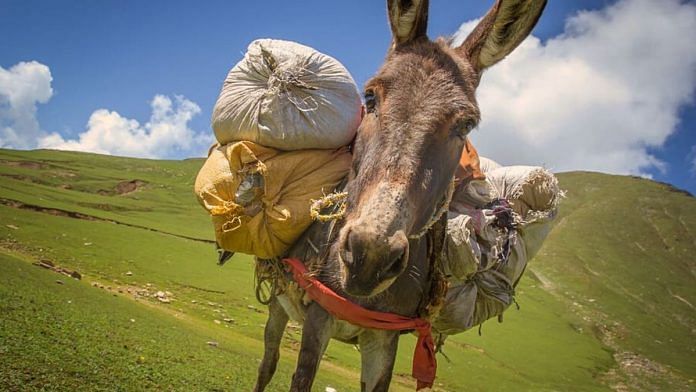The China-Pakistan friendship is proverbially described as “higher than mountains, deeper than the ocean, stronger than steel and sweeter than honey”. But now, Pakistani donkeys are also boosting this relationship.
Pakistan is planning to ramp up its export business of donkeys with the Punjab government setting up a farm in Okara district for donkey breeding.
China, said to be the largest donkey breeder in the world, uses donkey hides as a key ingredient in ejiao — a traditional Chinese medicine used to treat blood circulation, anaemia and reproductive issues, though the alleged medicinal claims are unproven.
The donkey farm, spread over 3,000 acres of land, has been set up at Bahadurnagar in Punjab, as reported by Ary News.
Pakistan's first donkey breeding farm in Okara. "The farm has been set up in response to the rising demand for donkeys in China and other countries." https://t.co/o62P2XA2oW
— Naila Inayat (@nailainayat) August 28, 2021
According to a 2019 report in The Guardian, the population of donkeys declined by 76% in the People’s Republic of China since 1992, pushing the country to rely on imports from developing countries.
Before Beijing turned to Islamabad for help, it was importing the donkey skins from Niger and Burkina Faso, until the two West African countries banned their export.
Also read:
Not a first for Pakistan
This is not the first time Pakistan has decided to expand the global donkey skin trade, to aid its friend for donkey’s years. In 2017, according to a report in The Express Tribune, the Khyber-Pakhtunkhwa government had also announced a $1 billion-worth project — ‘Khyber-Pakhtunkhwa-China Sustainable Donkey Development Programme’ — aimed at increasing the donkey population in the province. In the guise of the ‘development’ project, Pakistan hoped to gain additional investment in the agriculture sector under the China-Pakistan Economic Corridor (CPEC).
It was also reported that a donkey hospital in Lahore and two farms were set up in Mansehra and Dera Ismail Khan in Pakistan.
In 2015, the Economic Coordination Committee chaired by then-finance minister Ishaq Dar had temporarily banned the export of donkeys, which has now been lifted.
Also read: Mobile phones are the latest addition to Imran Khan’s list of reasons for rape in Pakistan
Is ejiao the new ivory?
Much like the illegal trade of ivory tusks of elephants, hippopotamus, narwhal and walrus, donkeys are slaughtered and their skins are boiled to be used as a key component in manufacturing ejiao gel, the age-old Chinese medicine.
The rise in demand for donkey skins has been devastating for the animal’s deteriorating population across the world.
Many families in Pakistan rely on donkeys as their primary source of income and means of transportation. With the expected surge in their breeding, threat of theft of these animals will also likely increase. Pakistan, along with other middle-eastern countries, is known to have a large population of these domesticated animals.
According to research done by Donkey Sanctuary UK, a disturbing trend emerges that hints towards a rapid decline as these animals are slaughtered at an industrial scale to meet the global demand.
China needs over four million donkey skins each year to meet its requirement for manufacturing cosmetic products and ejiao gel, but the supply of these animals is fewer than 1.8 million, as reported by Chinese state-run news agency Xinhua. From 11 million donkeys in 1992, three-quarters of the population has diminished by 2019 in China. It is estimated that it might take another 20 years to acquire the levels needed for the ejiao industry.
(Edited by Prashant Dixit)



